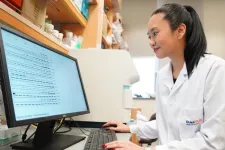(Press-News.org) -With images-
Researchers at Durham University, UK and Isfahan University of Medical Sciences, Iran have developed an innovative approach to diagnosing Multiple Sclerosis using advanced eye imaging techniques.
This groundbreaking method could revolutionise how Multiple Sclerosis is detected, offering a faster, less invasive, and more accessible alternative to current diagnostic procedures.
The study, led by Dr Raheleh Kafieh of Durham University, integrates two types of eye scans: optical coherence tomography (OCT) and infrared scanning laser ophthalmoscopy (IR-SLO).
By training computer models with large numbers of these eye scans, the researchers have created a powerful diagnostic tool that can identify Multiple Sclerosis with remarkable accuracy.
What sets this approach apart is its ability to detect subtle changes in the eye that are often indicative of Multiple Sclerosis. The eye, being directly connected to the brain, can reveal early signs of neurological damage that might otherwise go unnoticed.
By training computers to recognise hidden patterns and abnormalities in eye images, this method offers the potential for earlier diagnosis and better management of Multiple Sclerosis symptoms.
The results of the study are impressive, with the computer model correctly identifying Multiple Sclerosis in 92% of cases during initial tests.
Even more encouraging, the system maintained a strong 85% accuracy when tested on a different set of data from other hospitals and populations, demonstrating its reliability and potential for widespread use.
Lead author of the study, Dr Raheleh Kafieh of Durham University’s Engineering department emphasised the significance of these findings and said: “Incorporating all available medical imaging, including those with subtle changes that are difficult to discern through non-computerised diagnosis, is crucial for achieving more reliable diagnoses and improving patient outcomes.”
This innovative approach could have far-reaching implications for patients and healthcare providers alike. Early and accurate diagnosis of Multiple Sclerosis can dramatically impact the quality of life for those affected, potentially slowing the progression of the disease and improving overall outcomes.
Moreover, the non-invasive nature of eye scans makes this method more comfortable for patients and easier to implement in various healthcare settings, including high street opticians.
This novel eye imaging technique not only promises to enhance Multiple Sclerosis diagnosis but also opens doors for similar applications in other neurological conditions such as Alzheimer's and Parkinson's disease.
As this technology continues to develop, it could pave the way for more accessible and reliable diagnostic tools in everyday healthcare, ultimately leading to better patient care and outcomes.
ENDS
Media Information
Dr Raheleh Kafieh from Durham University is available for interview and can be contacted on raheleh.kafieh@durham.ac.uk.
Alternatively, please contact Durham University Communications Office for interview requests on communications.team@durham.ac.uk or +44 (0)191 334 8623.
Source
‘SLO-Net: Enhancing Multiple Sclerosis Diagnosis Beyond Optical Coherence Tomography 3 using Infrared Reflectance Scanning Laser Ophthalmoscopy Images’, (2024), R Arian, A Aghababaei, A Soltanipour, Z Khodabandeh, S Rakhshani, S B Iyer, F Ashtari, H Rabbani & R Kafieh, AVRO. https://doi.org/10.1167/tvst.13.7.13
An embargoed copy of the paper is available from Durham University Communications Office. Please email communications.team@durham.ac.uk.
Graphics
Associated images are available via the following link: https://www.dropbox.com/scl/fo/78zltj8qtg6i6roenmj4y/AN4MOFWAhOQF_ZiEAETlnLo?rlkey=dmpur3q7m5h034zp7svw14x8h&st=o24erqpk&dl=0
About Durham University
Durham University is a globally outstanding centre of teaching and research based in historic Durham City in the UK.
We are a collegiate university committed to inspiring our people to do outstanding things at Durham and in the world.
We conduct research that improves lives globally and we are ranked as a world top 100 university with an international reputation in research and education (QS World University Rankings 2025).
We are a member of the Russell Group of leading research-intensive UK universities and we are consistently ranked as a top 10 university in national league tables (Times and Sunday Times Good University Guide, Guardian University Guide and The Complete University Guide).
For more information about Durham University visit: www.durham.ac.uk/about/
END OF MEDIA RELEASE – issued by Durham University Communications Office.
END
New Durham University study shows promising diagnosis of Multiple Sclerosis from images of the eye
Embargoed until 1500 BST on Wednesday 17 July 2024
2024-07-17
ELSE PRESS RELEASES FROM THIS DATE:
New training program facilitates home-based transcranial electrical stimulation
2024-07-17
Traveling to and from a clinic or a laboratory for treatment can be difficult and expensive for older Americans. To address this, scientists developed and tested a new training and supervision program for older adults so they can receive Transcranial Electrical Stimulation (tES), a promising intervention for various clinical conditions, in their homes.
Published in Neuromodulation: Technology at the Neural Interface, this groundbreaking training and supervision program was designed to introduce and teach caregivers, family members, and patients how to administer home-based transcranial electrical stimulation (HB-tES), equipping them ...
Study finds persistent proteins may influence metabolomics results
2024-07-17
GRAND RAPIDS, Mich. (July 17, 2024) — Van Andel Institute scientists have identified more than 1,000 previously undetected proteins in common metabolite samples, which persist despite extraction methods designed to weed them out.
The findings, published in Nature Communications, give scientists new insights and tools for improving future metabolomics experiments, including a novel protocol for removing these proteins during the extraction process. The study does not invalidate prior results but instead reinforces the importance ...
Living in greener neighborhoods during midlife can slow cognitive decline
2024-07-17
A new study found that increased exposure to residential greenery may help stave off cognitive decline by an annual rate of eight months. This delay was observed more among people living in low-socioeconomic status and highly populated neighborhoods, as well as people who carry the APOE-ɛ4 gene, which is associated with an increased risk of Alzheimer’s disease.
Research has shown that about 40 percent of dementia could be prevented or delayed worldwide by addressing modifiable risk factors associated with the condition, particularly during midlife.
A new study led by a Boston University School of Public Health (BUSPH) ...
Research tracks 66 million years of mammalian diversity
2024-07-17
When trying to understand the present, it's helpful to look to history. New research from the University of Nebraska–Lincoln examined the fossil record going back 66 million years and tracked changes to mammalian ecosystems and species diversity on the North American continent.
The study, led by Alex Shupinski, who earned her doctorate in May, and co-authored by Kate Lyons, associate professor in the School of Biological Sciences, provides a large-scale view of how species diversity changed over the first 65 million years of the Cenozoic era — up until the arrival of humans — ...
RegeneratOR Test Bed welcomes Cytoink to accelerate biomedical innovations
2024-07-17
Winston-Salem, North Carolina — July 17, 2024 — The RegeneratOR Test Bed, located in Innovation Quarter, announces the inclusion of Cytoink into its pioneering ecosystem dedicated to advancing biomedical research and development. Cytoink brings cutting-edge biomaterials manufacturing, with over 100 custom formulations, and bioprinting expertise that merges biofunctionality with high-throughput production. Cytoink specializes in the biofabrication of in vitro 3D tissue phantoms, extrusion-based and light-based (DLP/VAM) bioinks, and integrated perfusion microfluidics bioreactors. Additionally, Cytoink provides bespoke biomaterial solutions ...
Jeffrey Spraggins named director of Vanderbilt University Mass Spectrometry Research Center
2024-07-17
Jeffrey Spraggins, associate professor of cell and developmental biology, biochemistry, and chemistry, has been named director of the Mass Spectrometry Research Center. He succeeds Richard Caprioli, Stanford Moore Chair in Biochemistry, who established the MSRC in 1998 and who is retiring this summer.
Spraggins is a leading scientist in spatial biology and imaging mass spectrometry—an untargeted molecular imaging approach that enables molecular mapping at cellular resolution—a technology originated by Caprioli. Spraggins’ research lies at the intersection of technology development, data science, and biomedical research. His research group ...
Duke-NUS finding advances quest to slow ageing
2024-07-17
An ageing population will bring colossal health, social, and economic challenges over the coming decades[1]. As people live longer, staving off the physical decline and frailty that come with age has become a holy grail, with effective interventions projected to unlock significant societal and economic benefits. Estimates suggest that a slowdown in ageing that increases life expectancy by one year alone is worth US$38 trillion.[2]
In a discovery published in Nature, a team of scientists from Duke-NUS Medical School in Singapore may have found a key to slow ageing.
The ...
Logged forests can still have ecological value – if not pushed too far
2024-07-17
Researchers have analysed data from 127 studies to reveal ‘thresholds’ for when logged rainforests lose the ability to sustain themselves.
The results could widen the scope of which forests are considered ‘worth’ conserving, but also show how much logging degrades forests beyond the point of no return.
The first-of-its-kind study, led by researchers from the Department of Life Sciences at Imperial College London with collaborators from around the world, is published today in ...
Exoplanet caught in ‘hairpin turn’ signals how high-mass gas giants form
2024-07-17
UNIVERSITY PARK, Pa. — Astronomers have discovered a planet that has the most oblong orbit ever found among transiting planets. The exoplanet’s extreme circuit — which looks closer to a cucumber than a circle — follows one of the most drastically stretched-out orbits of all known exoplanets, planets that orbit stars outside our solar system. It is also orbiting its star backwards, lending insight into the mystery of how close-in massive gas planets, known as hot Jupiters, form, stabilize and evolve over time.
The research, led by Penn State scientists, was published today (July 17) in ...
Switching off inflammatory protein leads to longer, healthier lifespans in mice
2024-07-17
Scientists at the Medical Research Council Laboratory of Medical Science and Imperial College London have discovered that ‘switching off’ a protein called IL-11 can significantly increase the healthy lifespan of mice by almost 25%.
The scientists, working with colleagues at Duke-NUS Medical School in Singapore, tested the effects of IL-11 by creating mice that had the gene producing IL-11 (interleukin 11) deleted. This extended the lives of the mice by over 20% on average.
They also treated 75-week-old mice – equivalent to the age of about 55 years in humans – with an ...
LAST 30 PRESS RELEASES:
Power in motion: transforming energy harvesting with gyroscopes
Ketamine high NOT related to treatment success for people with alcohol problems, study finds
1 in 6 Medicare beneficiaries depend on telehealth for key medical care
Maps can encourage home radon testing in the right settings
Exploring the link between hearing loss and cognitive decline
Machine learning tool can predict serious transplant complications months earlier
Prevalence of over-the-counter and prescription medication use in the US
US child mental health care need, unmet needs, and difficulty accessing services
Incidental rotator cuff abnormalities on magnetic resonance imaging
Sensing local fibers in pancreatic tumors, cancer cells ‘choose’ to either grow or tolerate treatment
Barriers to mental health care leave many children behind, new data cautions
Cancer and inflammation: immunologic interplay, translational advances, and clinical strategies
Bioactive polyphenolic compounds and in vitro anti-degenerative property-based pharmacological propensities of some promising germplasms of Amaranthus hypochondriacus L.
AI-powered companionship: PolyU interfaculty scholar harnesses music and empathetic speech in robots to combat loneliness
Antarctica sits above Earth’s strongest “gravity hole.” Now we know how it got that way
Haircare products made with botanicals protects strands, adds shine
Enhanced pulmonary nodule detection and classification using artificial intelligence on LIDC-IDRI data
Using NBA, study finds that pay differences among top performers can erode cooperation
Korea University, Stanford University, and IESGA launch Water Sustainability Index to combat ESG greenwashing
Molecular glue discovery: large scale instead of lucky strike
Insulin resistance predictor highlights cancer connection
Explaining next-generation solar cells
Slippery ions create a smoother path to blue energy
Magnetic resonance imaging opens the door to better treatments for underdiagnosed atypical Parkinsonisms
National poll finds gaps in community preparedness for teen cardiac emergencies
One strategy to block both drug-resistant bacteria and influenza: new broad-spectrum infection prevention approach validated
Survey: 3 in 4 skip physical therapy homework, stunting progress
College students who spend hours on social media are more likely to be lonely – national US study
Evidence behind intermittent fasting for weight loss fails to match hype
How AI tools like DeepSeek are transforming emotional and mental health care of Chinese youth
[Press-News.org] New Durham University study shows promising diagnosis of Multiple Sclerosis from images of the eyeEmbargoed until 1500 BST on Wednesday 17 July 2024






